|
|
|
Sort Order |
|
|
|
Items / Page
|
|
|
|
|
|
|
| Srl | Item |
| 1 |
ID:
148513
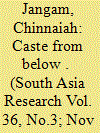

|
|
|
|
|
| Summary/Abstract |
Based on the life of the noted Chindu Yakshagana performer, Yellamma, this article presents the lived experience of caste through the lens of India’s Dalits, as narrated by the Chindus, a dependent caste of Madigas of Telangana. This provides a glimpse into the inner world of caste-based relationships through analysis of a satellite caste system that remains inaccessible to the dominant Hindu Brahmanical world and most scholarship on caste. Satellite castes function as preservers of social memory and act as cultural archives, enacting caste histories and origin myths, while critiquing and inverting dominant perceptions and weaving positive stories. The article argues that there may well be much more to this performative protest than merely social subversion.
|
|
|
|
|
|
|
|
|
|
|
|
|
|
|
|
| 2 |
ID:
148512
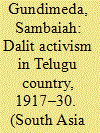

|
|
|
|
|
| Summary/Abstract |
This article argues that the politics of lower castes and their struggles for social equality and political representation cannot be effectively subsumed under a homogenous non-Brahmin category. Contesting the argument that the mobilisation of the lower castes/non-Brahmins in southern India was organised around the ideology of Dravidianism, this research examines what is today called Dalit activism in the Telugu country, related to the ideology of Adi-Dravida/Adi-Hindu. It also identifies discrimination of Dalits as well as between Dalits, in times before Gandhi and Ambedkar appeared on the scene.
|
|
|
|
|
|
|
|
|
|
|
|
|
|
|
|
| 3 |
ID:
148514
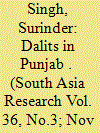

|
|
|
|
|
| Summary/Abstract |
Rising cultural consciousness among Dalits in Punjab underpins recent endeavours to construct a distinct identity and cultural heritage. The article examines how this renovation of identity and culture, centred on claiming and gaining social esteem and self-respect, is visibly expressed in heritage construction, with important support through transnational diasporic connections. This article shows specifically how monetary and ideational inputs for construction of two Ad Dharmi jathera shrines have created an impressive monumental heritage that promotes and reflects rising cultural confidence among the Dalits in Punjab and generates enthusiasm in the whole community. This provides them assurances of a more respectable life, both at home and abroad, yet also introduces new divisions and diversities.
|
|
|
|
|
|
|
|
|
|
|
|
|
|
|
|
| 4 |
ID:
148516


|
|
|
|
|
| Summary/Abstract |
Talking about the transformational potentialities of ‘basic income’ in a place like India is a substantive declaration of the benefits of cash transfer, but this may be a fallacy. The study under review issues a clarion call to switch from the existing work- and commodity-based social security measures, mainly the Mahatma Gandhi National Rural Employment Guarantee Scheme (MGNREGS) and the Public Distribution System (PDS), to universal unconditional cash transfer. This seemingly attractive argument is based on a pilot action research, conducted in select villages of Indore District of Madhya Pradesh in 2011–12.1 The book’s initial tall claim is that ‘a modest basic income, paid monthly in cash, individually and without conditions, would be a means of achieving three development objectives [welfare, growth and emancipation] that taken together would be transformational’ (p. viii). The authors proclaim this again, soon after, urging that these benefits of welfare, growth and emancipation power of basic income, defined ‘as a sum paid regularly, in money, to individuals, without conditions, as a universal or rights-based payment, paid as an equal amount to all adults as citizens’ (p. 5), are greater than those of the MGNREGS and PDS. The arguments advanced in the book and the evidence of the pilot experiment would add to the armoury of the protagonists of cash transfers in India, who until now have pressed for this mostly as a leakage proofing mechanism (Kapur et al., 2008).
|
|
|
|
|
|
|
|
|
|
|
|
|
|
|
|
| 5 |
ID:
148511
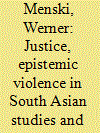

|
|
|
|
|
| Summary/Abstract |
This editorial article covers much more than Dalits and untouchability, because ‘caste’ itself is about life, similar to the inevitably related human constructs of ‘law’, ‘religion’, ‘society’, ‘culture’ and also ‘race’ and ‘gender’. This article and the contributions in this Special Issue will not resolve the ongoing turbulences over caste, but may be useful tools to identify avenues for more constructive debates, rather than acrimonious exchanges. The key argument of the present article is that while difference is part of the human experience everywhere, ‘caste’, however disagreeable, remains an ancient culture-specific component of the intensely plural current identity of South Asia and South Asians, wherever they may be in the world today. It seems impossible to deny, ban or abolish this entity, which continues to serve as an identity marker, often in efforts to resist ongoing discriminations. Academic debates thus need to develop more constructive and sophisticated methods in various current attempts to acknowledge the multivocal stances on ‘caste’ and to negotiate better justice rather than falling into traps of all kinds of phobias, old and new. Approaches which simply deny that caste still exists, posit that it can just be abolished or claim that it cannot ever be adequately debated are unhelpful and just increase the heat in existing chaotic and largely self-righteous discourses. The article suggests that ancient Indians seem to have known much more about diversity management than we care to admit, while messiness and chaos remain prominent all around us today. This is not idolising a glorious past, but critiquing the present chaos while searching for justice-conscious remedies in diversity management.
|
|
|
|
|
|
|
|
|
|
|
|
|
|
|
|
| 6 |
ID:
148515
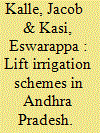

|
|
|
|
|
| Summary/Abstract |
Despite efforts by the Indian state to develop and maintain various irrigation strategies, many projects have not achieved the desired results, often due to systemic problems inherent in these initiatives. Meanwhile, the growing scarcity of water in South Asia propels new thinking about remedies. Based on detailed fieldwork, this article, which seems at first completely unrelated to matters of caste discrimination, assesses the sustainability of lift irrigation schemes (LIS) in Andhra Pradesh (AP). Asking critical questions about the management of such schemes, it also addresses the impact of new technologies on rural development, arguing that continuing technology-savvy engagement of the state in the irrigation sector is needed. While it is found that apart from issues of better management, increased use of solar energy could be a real boon for strengthening economic viability and environmental sustainability, the research identifies additional reasons, of a socio-political nature, which may explain why state support for marginal farmers in the area under examination is being withheld.
|
|
|
|
|
|
|
|
|
|
|
|
|
|
|
|
|
|
|
|
|